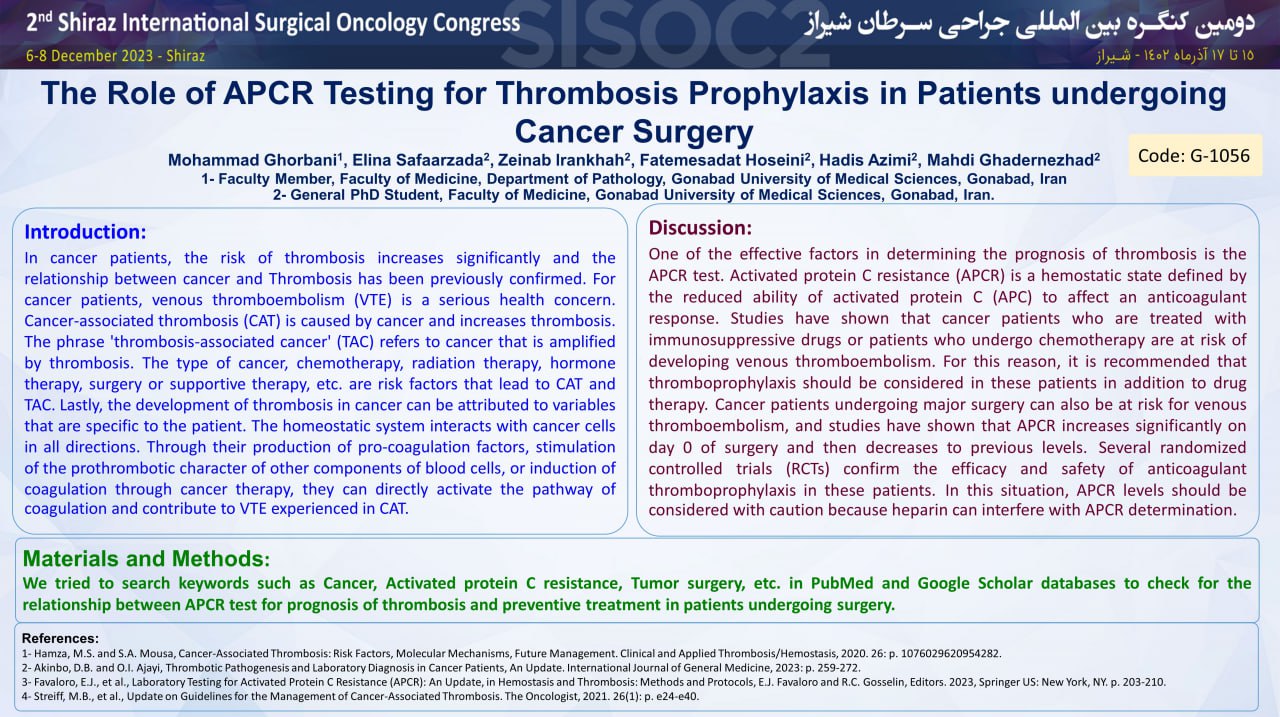نقش تست APCR برای پروفیلاکسی ترومبوز در بیماران تحت عمل جراحی سرطان
کد: G-1056
نویسندگان: محمد قربانی, الینا صفارزاده ℗, زینب ایرانخواه, فاطمه سادات حسینی, حدیث عظیمی کردیانی, مهدی قادرنژاد ©
زمان بندی: پنجشنبه ۱۴۰۲/۰۹/۱۶ ۱۶:۴۵ بر روی یونیت Panel A
دانلود: دانلود پوستر
خلاصه مقاله:
خلاصه مقاله
In cancer patients, the risk of thrombosis increases significantly and the relationship between cancer and Thrombosis has been previously confirmed. For cancer patients, venous thromboembolism (VTE) is a serious health concern. Cancer-associated thrombosis (CAT) is caused by cancer and increases thrombosis. The phrase 'thrombosis-associated cancer' (TAC) refers to cancer that is amplified by thrombosis. The type of cancer, chemotherapy, radiation therapy, hormone therapy, surgery or supportive therapy, etc. are risk factors that lead to CAT and TAC. Lastly, the development of thrombosis in cancer can be attributed to variables that are specific to the patient. The homeostatic system interacts with cancer cells in all directions. Through their production of pro-coagulation factors, stimulation of the prothrombotic character of other components of blood cells, or induction of coagulation through cancer therapy, they can directly activate the pathway of coagulation and contribute to VTE experienced in CAT. One of the effective factors in determining the prognosis of thrombosis is the APCR test. Activated protein C resistance (APCR) is a hemostatic state defined by the reduced ability of activated protein C (APC) to affect an anticoagulant response. The most common genetic disorder that causes APCR is the factor V Leiden mutation, but evidence has shown that acquired APCR without this mutation can also occur in cancer. On the other hand, studies have shown that cancer patients who are treated with immunosuppressive drugs or patients who undergo chemotherapy are at risk of developing venous thromboembolism. For this reason, it is recommended that thromboprophylaxis should be considered in these patients in addition to drug therapy. Cancer patients undergoing major surgery can also be at risk for venous thromboembolism, and studies have shown that APCR increases significantly on day 0 of surgery and then decreases to previous levels. Several randomized controlled trials (RCTs) confirm the efficacy and safety of anticoagulant thromboprophylaxis in these patients. In this situation, APCR levels should be considered with caution because heparin can interfere with APCR determination. In this review study, we try to investigate the relationship between APCR test for the prognosis of thrombosis and prophylactic treatment in patients undergoing cancer surgery.
کلمات کلیدی
Cancer, Activated protein C resistance, APCR, Cancer surgery, Thrombosis, Thromboprophylaxis, CAT, TAC.
دیدگاه ها (0)
ارسال یک دیدگاه
ارسال دیدگاه توسط مدیریت بسته شده است.
